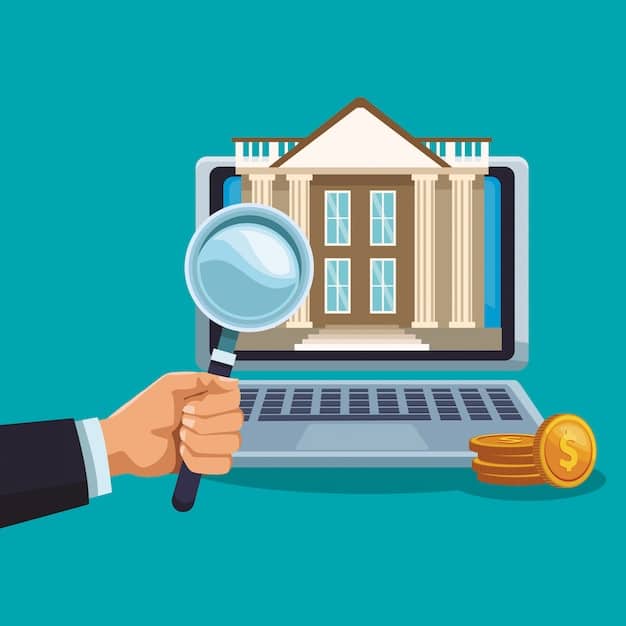Unclaimed Government Money: Find and Claim Your Funds in 3 Months

Unclaimed government money refers to funds held by federal and state agencies that rightfully belong to individuals and businesses; discovering and claiming these assets within three months involves strategic searches of official databases and prompt application processes.
Did you know the government might be holding money that belongs to you? Millions of dollars in **unclaimed government money** sit waiting for their rightful owners. Let’s explore how to find and claim what’s yours within the next three months.
What is Unclaimed Government Money?
Unclaimed government money encompasses various types of funds held by federal and state agencies. These funds can originate from several sources, including uncashed checks, forgotten tax refunds, dormant bank accounts, and overpayments. Understanding the nature of this money is the first step toward recovering what rightfully belongs to you.
Types of Unclaimed Funds
The government holds onto a variety of unclaimed funds, each with its own source and set of regulations. Recognizing the different types can streamline your search and increase your chances of a successful claim.
- Uncashed Checks: These are checks issued by government agencies that were never cashed, often due to a change of address or the recipient simply forgetting about them.
- Tax Refunds: Overpayments on taxes can result in refunds, which, if unclaimed, are held by the IRS or state tax agencies.
- Dormant Bank Accounts: Banks insured by the FDIC are legally required to turn over any dormant funds to the state after a certain period
Knowing these different sources can help you start the search.
Why Does the Government Hold Unclaimed Money?
The government doesn’t intentionally hold onto unclaimed money. These funds accumulate due to administrative issues, errors in contact information, or simply people forgetting about the money owed to them. When the government cannot locate the rightful owner, the funds are held in trust until a claim is made.

How to Search for Unclaimed Government Money
Searching for unclaimed government money requires a strategic approach and persistence. Several government websites and databases are available to assist in this process. By using the right resources and methods, you can significantly improve your chances of finding unclaimed funds.
Federal Resources for Unclaimed Money
Several federal agencies maintain databases of unclaimed funds. These resources are a good starting point for your search, as they cover a broad range of potential sources.
- IRS (Internal Revenue Service): Check the IRS website for unclaimed tax refunds. You can use the “Where’s My Refund?” tool or create an online account to track your refund status.
- Treasury Department: The Treasury Department holds unclaimed savings bonds and other securities. Visit TreasuryDirect.gov to search for matured or lost savings bonds.
These resources can help you identify if your unclaimed money is federal.
State Resources for Unclaimed Money
In addition to federal databases, each state has its own unclaimed property program. These programs hold funds from various sources, including uncashed checks, dormant bank accounts, and insurance payments. Checking your state’s unclaimed property website is crucial in your search.
To find your state’s unclaimed property program, search online for “[your state] unclaimed property.” Most states offer online search tools where you can enter your name and other identifying information to check for unclaimed funds.

Claiming Your Unclaimed Government Money
Once you’ve identified unclaimed funds, the next step is to file a claim to recover your money. The claiming process typically involves providing documentation to verify your identity and ownership of the funds. Follow the instructions provided by the agency or state holding the money, and be prepared to submit the necessary paperwork.
Required Documentation
When filing a claim for unclaimed government money, you’ll typically need to provide documentation to verify your identity and your right to the funds. The specific documents required may vary depending on the agency and the nature of the unclaimed money, but here are some common examples of documentation you may need:
- Proof of Identity: Government-issued photo ID (driver’s license, passport)
- Proof of Address: Utility bill, lease agreement, or other official document showing your current address
- Social Security Number: Your Social Security number for verification purposes.
Collecting all appropriate documents can streamline the process.
Common Mistakes to Avoid
The claiming process can sometimes be complex and time-consuming, and it’s easy to make mistakes that could delay or even invalidate your claim. Being aware of common errors and taking steps to avoid them can increase your chances of a successful claim.
One common mistake is failing to provide all the required documentation. Make sure you carefully review the instructions and submit all necessary paperwork, including proof of identity, proof of address, and any other documents requested by the agency or state holding the funds.
Tips for a Successful Claim within 3 Months
Claiming unclaimed government money within a three-month timeframe requires efficiency and organization. Knowing how to expedite the process and avoid common pitfalls can significantly increase your chances of success.
Stay Organized
Keep a detailed record of all searches conducted and documentation submitted. This will help you track your progress and provide important information if you need to follow up on your claim.
- Maintain a spreadsheet of where you searched and the dates
- Keep copies of all forms and correspondence.
- Use cloud services to prevent losing docs.
Organization can save you time and make sure all steps are followed.
Avoid Scams
Be cautious of scams promising to help you recover unclaimed money for a fee. Legitimate government agencies will never ask for payment upfront to process your claim. Do not share personal information with these entities.
Maintaining Awareness
Staying informed and proactive is key to maximizing your chances of successfully tracking and claiming unclaimed government money. Learning where to find information and making regular checkups into these areas will keep you prepared for the unexpected.
Sign up for Alerts
Consider signing up for alerts from relevant government agencies and unclaimed property programs to stay informed of any new developments or potential unclaimed funds associated with your name. This can provide early notification of potential recovery opportunities.
Regularly Check Databases
Make it a habit to check unclaimed property databases and government websites periodically, even if you haven’t found anything in the past. New funds are added regularly as more checks go uncashed and more accounts lie dormant.
| Key Point | Brief Description |
|---|---|
| 💰 Search Federal Databases | Check IRS and Treasury Department for unclaimed funds. |
| 🏢 Check State Resources | Visit your state’s unclaimed property website. |
| 📝 Gather Documents | Collect ID, proof of address, and Social Security number. |
| 🛡️ Avoid Scams | Be wary of anyone asking for upfront fees. |
Frequently Asked Questions
▼
Unclaimed money includes uncashed checks, tax refunds, dormant bank accounts, and forgotten insurance payments. These funds accumulate when the government cannot locate the rightful owners.
▼
You can check by visiting the official websites of the IRS, the U.S. Treasury, and your state’s unclaimed property office. Search using your name and any previous addresses.
▼
Typically, you’ll need a government-issued photo ID, proof of current address (such as a utility bill), and your Social Security number for verification purposes.
▼
No, legitimate government agencies do not charge upfront fees for helping you recover unclaimed money. Be cautious of scams that promise to help for a fee.
▼
It’s a good idea to check unclaimed property databases and government websites at least once a year, as new funds are regularly added when people move or forget about accounts.
Conclusion
Finding and claiming unclaimed government money is a worthwhile endeavor that can put unexpected funds back in your pocket. By understanding the types of unclaimed funds, knowing where to search, and following the proper claiming procedures, you can successfully navigate the process and recover what’s rightfully yours.





